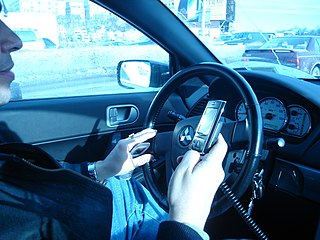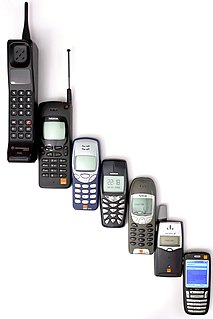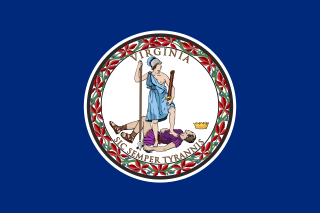
In espionage and counterintelligence, surveillance is the monitoring of behavior, activities, or other changing information for the purpose of influencing, managing, directing, or protecting people. This can include observation from a distance by means of electronic equipment or interception of electronically transmitted information. It can also include simple no- or relatively low-technology methods such as human intelligence agent and postal interception. The word surveillance comes from a French phrase for "watching over" and is in contrast to more recent developments such as sousveillance.
Telephone tapping is the monitoring of telephone and Internet-based conversations by a third party, often by covert means. The wire tap received its name because, historically, the monitoring connection was an actual electrical tap on the telephone line. Legal wiretapping by a government agency is also called lawful interception. Passive wiretapping monitors or records the traffic, while active wiretapping alters or otherwise affects it.

Newport News is an independent city in the U.S. state of Virginia. As of the 2010 census, the population was 180,719. In 2013, the population was estimated to be 183,412, making it the fifth-most populous city in Virginia.

Hampton Roads is the name of both a body of water that serves as a wide channel for the James, Nansemond and Elizabeth rivers between Old Point Comfort and Sewell's Point where the Chesapeake Bay flows into the Atlantic Ocean and the surrounding metropolitan region located in the Southeastern Virginia and Northeastern North Carolina portions of the Tidewater region.
A pen register, or dialed number recorder (DNR), is an electronic device that records all numbers called from a particular telephone line. The term has come to include any device or program that performs similar functions to an original pen register, including programs monitoring Internet communications.

Mobile telephony is the provision of telephone services to phones which may move around freely rather than stay fixed in one location. Mobile phones connect to a terrestrial cellular network of base stations, whereas satellite phones connect to orbiting satellites. Both networks are interconnected to the public switched telephone network (PSTN) to allow any phone in the world to be dialed.

Hampton Roads Transit (HRT), incorporated on October 1, 1999, began through the voluntary merger of PENTRAN on the Virginia Peninsula and TRT in South Hampton Roads and currently serves over 22 million annual passengers within its 369-square-mile (960 km2) service area around Hampton Roads. The purpose of the HRT is to provide reliable and efficient transportation service and facilities to the Hampton Roads community.

The North American telephone area code 757 is a NANPA telephone area code covering the southeast corner of Virginia. It was established July 1, 1996, as a split from area code 804.

Mobile phone use while driving is common, but it is widely considered dangerous due to its potential for causing distracted driving and crashes. Due to the number of crashes that are related to conducting calls on a phone and texting while driving, some jurisdictions have made the use of calling on a phone while driving illegal. Many jurisdictions have enacted laws to ban handheld mobile phone use. Nevertheless, many jurisdictions allow use of a hands-free device. Driving while using a hands-free device is not safer than using a handheld phone to conduct calls, as concluded by case-crossover studies, epidemiological, simulation, and meta-analysis. In some cases restrictions are directed only at minors, those who are newly qualified license holders, or to drivers in school zones. In addition to voice calling, activities such as texting while driving, web browsing, playing video games, or phone use in general can also increase the risk of a crash.

A mobile phone, cell phone, cellphone, or hand phone, sometimes shortened to simply mobile, cell or just phone, is a portable telephone that can make and receive calls over a radio frequency link while the user is moving within a telephone service area. The radio frequency link establishes a connection to the switching systems of a mobile phone operator, which provides access to the public switched telephone network (PSTN). Modern mobile telephone services use a cellular network architecture, and, therefore, mobile telephones are called cellular telephones or cell phones, in North America. In addition to telephony, 2000s-era mobile phones support a variety of other services, such as text messaging, MMS, email, Internet access, short-range wireless communications, business applications, video games, and digital photography. Mobile phones offering only those capabilities are known as feature phones; mobile phones which offer greatly advanced computing capabilities are referred to as smartphones.

Mobile device forensics is a branch of digital forensics relating to recovery of digital evidence or data from a mobile device under forensically sound conditions. The phrase mobile device usually refers to mobile phones; however, it can also relate to any digital device that has both internal memory and communication ability, including PDA devices, GPS devices and tablet computers.
Waze is a GPS navigation software app owned by Google. It works on smartphones and tablet computers that have GPS support. It provides turn-by-turn navigation information and user-submitted travel times and route details, while downloading location-dependent information over a mobile telephone network. Waze describes its app as a community-driven GPS navigation app, which is free to download and use.
Mobile security, or more specifically mobile device security, has become increasingly important in mobile computing. Of particular concern is the security of personal and business information now stored on smartphones.

The StingRay is an IMSI-catcher, a controversial cellular phone surveillance device, manufactured by Harris Corporation. Initially developed for the military and intelligence community, the StingRay and similar Harris devices are in widespread use by local and state law enforcement agencies across Canada, the United States, and in the United Kingdom. Stingray has also become a generic name to describe these kinds of devices.

Counter-IED efforts are done primarily by military and law enforcement with the assistance of the diplomatic and financial communities. It involves a comprehensive approach of countering the threat networks that employ improvised explosive devices (IEDs), defeating the devices themselves, and training others. Counter-IED, or C-IED, is usually part of a broader counter-terrorism, counter-insurgency, or law enforcement effort. Because IEDs are a subset of a number of forms of asymmetric warfare used by insurgents and terrorists, C-IED activities are principally against adversaries and not only against IEDs. C-IED treats the IED as a systemic problem and aims to defeat the IED System.
A phone log is metadata collected from telephone or mobile phones for the purpose of surveillance or espionage. This metadata may include: length of calls, phone numbers of both parties, phone-specific identification information, gps location, call proximity, and/or computer converted voice-to-text transcripts of the phone call conversation. The advantage of converting audio to ASCII text metadata is that it makes it easily searchable for keywords and phrases, and is easily storeable for long periods of time on conventional database systems for years. Phone logs are not limited to governmental collection. For example, some private sector companies, such as banks, are known to collect phone log data on their internal phone network of all calls within and between the company and outside parties.

The Hemisphere Project, also called simply Hemisphere, is a mass surveillance program conducted by US telephone company AT&T and paid for by the White House Office of National Drug Control Policy and the Drug Enforcement Administration.
Mass surveillance in Australia takes place in a number of network media including telephone, internet and other communications networks, financial systems, vehicle and transit networks, international travel, utilities, and government schemes and services including those asking citizens to report other citizens.

The Telecommunications Amendment Act 2015 is an Australian law that amends the Telecommunications Act 1979 and the Telecommunications Act 1997 to introduce a statutory obligation for Australian telecommunication service providers to retain, for a period of two years, particular types of telecommunications data (metadata) and introduces certain reforms to the regimes applying to the access of stored communications and telecommunications data under the TIA Act.

















